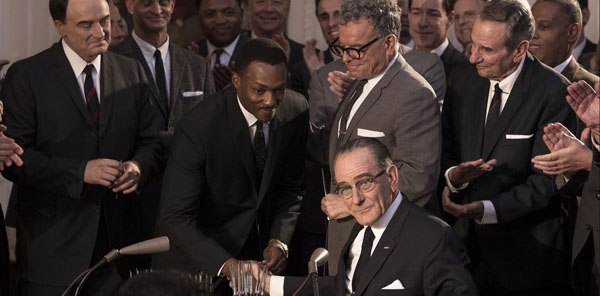
Josh Reviews HBO’s All The Way
The HBO film All the Way, directed by Jay Roach and written by Robert Schenkkan (adapting his play of the same name), is an in-depth look at the presidency of Lyndon B. Johnson. Specifically, All the Way focuses on the time between Johnson’s stepping into the Presidency following JFK’s assassination in 1963 and his re-election in 1964, and his long journey during that times working to get Congress to enact the Civil Rights Act of 1964. The film explores President Johnson’s often cantankerous, adversarial manner, and explores his relationship with Martin Luther King, Jr. and other key figures in his administration and in Congress.
I very much enjoyed All the Way. Jay Roach has made some wonderful political films in the past (Recount, Game Change), and he continues that win streak here. I loved the way the film so deeply explores the nuts and bolts of how the sausage gets made in governance. The film spends a tremendous amount of time following all of the political maneuverings that President Johnson had to do, over the course of such a long period of time, to ensure the passage of the Civil Rights Act. I suppose some might find that boring, but I thoroughly enjoyed it. (Though I freely admit the film’s lengthy run-time is challenging. I watched it over two nights, which I think is a good way to enjoy this film, more as a mini-series than as one single long film.)
As I was watching All the Way, I was struck by the ways in which it felt to me like something of a counterpoint to the recent film Selma. I adored that film, but like many reviewers I was struck by the ways in which that film seemed to minimize the involvement of President Johnson in Dr. King’s attempts to ensure the passage of the Civil Rights Act. In many ways, Selma cast LBJ in something of a villainous role, as someone obstructing Dr. King’s efforts. Here in All the Way, it seems like we get a completely different picture. LBJ is squarely the central heroic figure of this film, and instead it is Martin Luther King, Jr. who feels minimized, and cast in the role of someone who is not so helpful in ensuring the bill’s passage into law, but who is instead someone LBJ has to maneuver to get to do what he wants. Reality, I suppose, is somewhere in between.
The chief reason to watch this film is to enjoy Bryan Cranston’s fierce, mesmerizing performance as Lyndon B. Johnson. Mr. Cranston eats up every inch of the role, commanding the screen in his bulldog-like depiction of President Johnson. This is a bravura, movie-star performance, and it is a thrill to watch. He is able to portray LBJ’s bulldozing fierceness and also his insecurities and self-doubt. It’s a magnificent, screen-commanding performance.
Anthony Mackie has been great fun in Marvel’s recent movies as The Falcon, and he was a hoot in the comedic The Night Before. It’s terrific seeing him sink his teeth into this dramatic role as Martin Luther King, Jr., and Mr. Mackie is terrific in the role. It’s hard to compete with David Oyelowo’s incredible, mesmerizing performance as Dr. King from Selma, but Mr. Mackie holds his own in the role and makes it his own. He goes in a different direction with his performance, portraying Dr. King as a quiet, very in-control man. The film sidelines his character for a while, which is unfortunate — but while this is perhaps a weakness of the film (albeit an understandable one, as Dr. King is just a supporting character in this film whose focus is squarely on LBJ) — it does not detract from Mr. Mackie’s strong work.
The other standout of the film is Frank Langella as Senator Richard Russell, Jr., a key Democratic Senator. While going in I had expected the film to be about LBJ and Dr. King, I found that All the Way is far more focused on the story of the splintering of the relationship between LBJ and Senator Russell. As the film begins, we see that LBJ views Senator Russell as a mentor and father-figure, someone who he endearingly refers to by nickname. But as the story unfolds, LBJ begins to (correctly) see Senator Russell as someone standing in the way of progress, and someone who he will have to maneuver out of the way if he is going to be able to get the Civil Rights Act passed. The dinner scene in which their relationship shatters irrevocably is the best scene in the film, an electric moment brilliantly performed by these two powerhouse actors. Frank Langella is absolutely marvelous in the role. (Between this and his spectacular work on The Americans, this has been a tremendous year for Frank Langella!!)
The rest of the ensemble is terrific. The West Wing’s Bradley Whitford is phenomenal as the much-put-upon Hubert Humphrey, as is Melissa Leo as the much-put-upon Lady Bird Johnson. (According to this film, pretty much everyone in LBJ’s close personal orbit were much-put-upon!!) Stephen Root is terrific as J. Edgar Hoover, and Ray Wise is great in a smallish role as Senator Dirksen.
Come for Bryan Cranston’s spectacular work and stay for a fascinating look into the mechanics of politics. All the Way is set fifty years ago but it has a lot to say about our modern political and social climate. It’s terrific.
